International Marketing Report: Unilever's Global Strategies Analysis
VerifiedAdded on 2023/01/10
|8
|1817
|45
Report
AI Summary
This report provides an in-depth analysis of Unilever's international marketing strategies. It begins with an introduction to international marketing and defines standardization versus adaptation in the context of Unilever. The main body examines key trends affecting Unilever's operations, including changing customer relationships and the connected revolution, along with a focus on market strategies, products, and services. The report explores the reasons behind Unilever's international strategy development, including its global brand positioning and the 'think global, act global' approach. It also outlines key decisions in strategy development, such as customer needs and operational improvements, and discusses global challenges the firm faces, such as sustainability and supply chain risks. The conclusion summarizes the benefits of standardization and adaptation for Unilever's growth and long-term sustainability, referencing the impact of the strategies in the market.
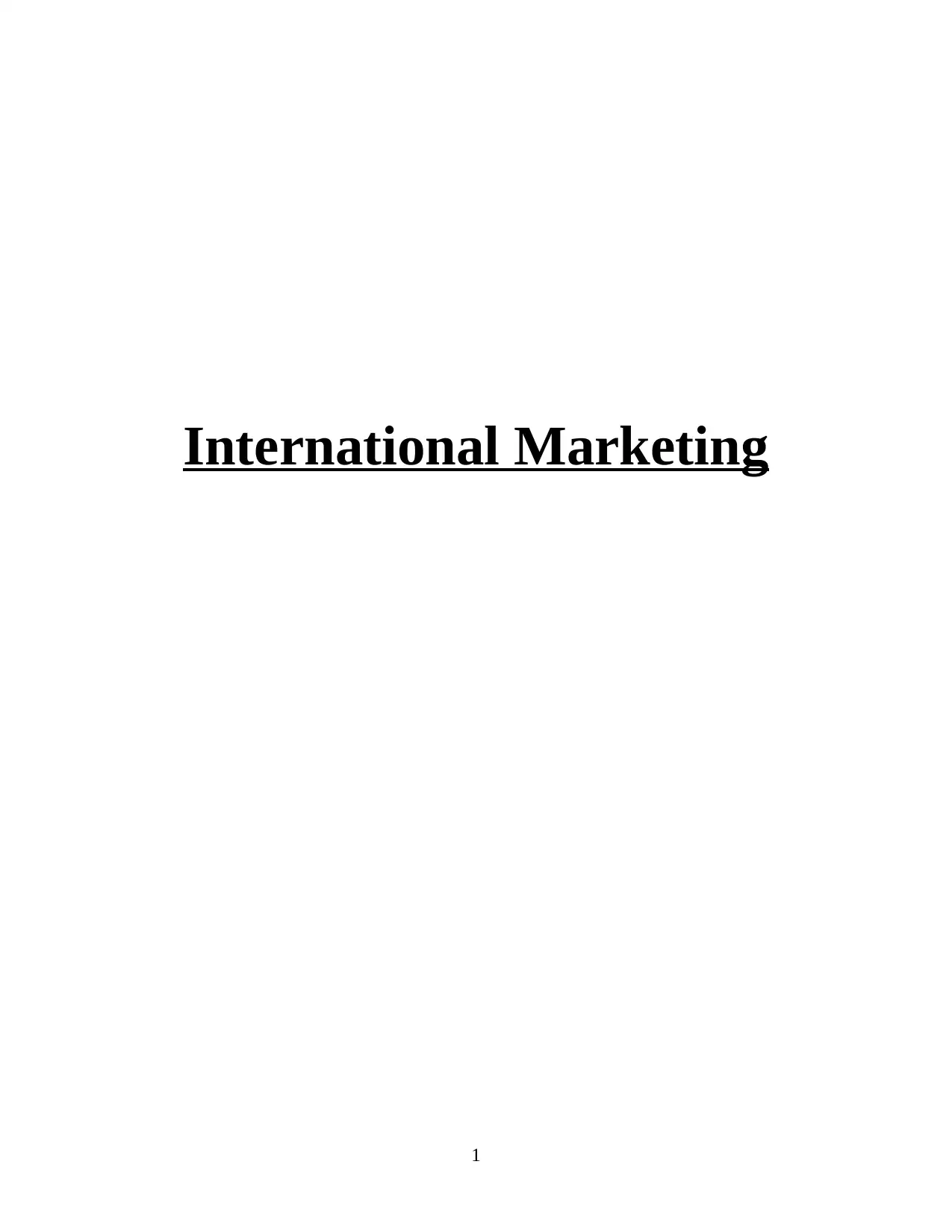
International Marketing
1
1
Paraphrase This Document
Need a fresh take? Get an instant paraphrase of this document with our AI Paraphraser
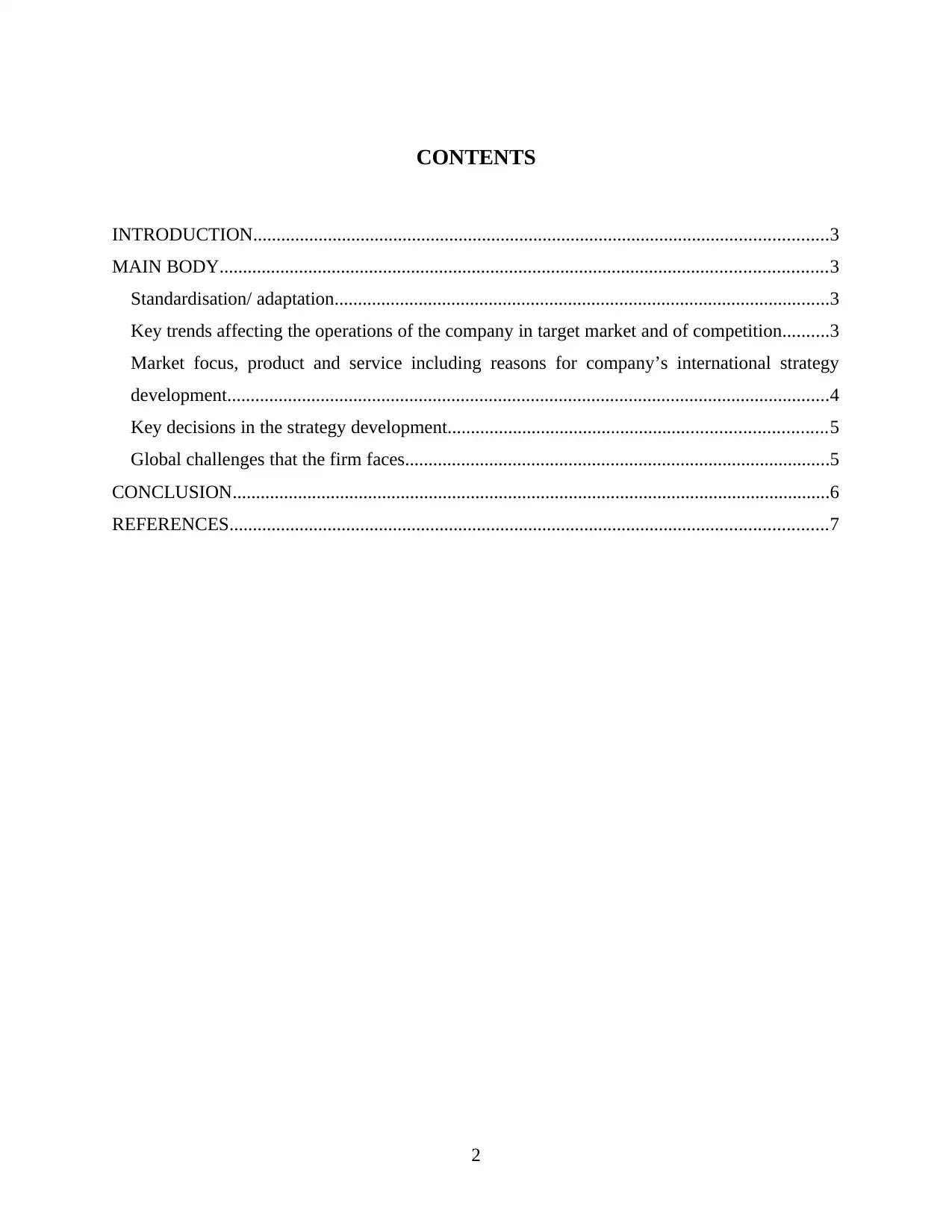
CONTENTS
INTRODUCTION...........................................................................................................................3
MAIN BODY..................................................................................................................................3
Standardisation/ adaptation..........................................................................................................3
Key trends affecting the operations of the company in target market and of competition..........3
Market focus, product and service including reasons for company’s international strategy
development.................................................................................................................................4
Key decisions in the strategy development.................................................................................5
Global challenges that the firm faces...........................................................................................5
CONCLUSION................................................................................................................................6
REFERENCES................................................................................................................................7
2
INTRODUCTION...........................................................................................................................3
MAIN BODY..................................................................................................................................3
Standardisation/ adaptation..........................................................................................................3
Key trends affecting the operations of the company in target market and of competition..........3
Market focus, product and service including reasons for company’s international strategy
development.................................................................................................................................4
Key decisions in the strategy development.................................................................................5
Global challenges that the firm faces...........................................................................................5
CONCLUSION................................................................................................................................6
REFERENCES................................................................................................................................7
2
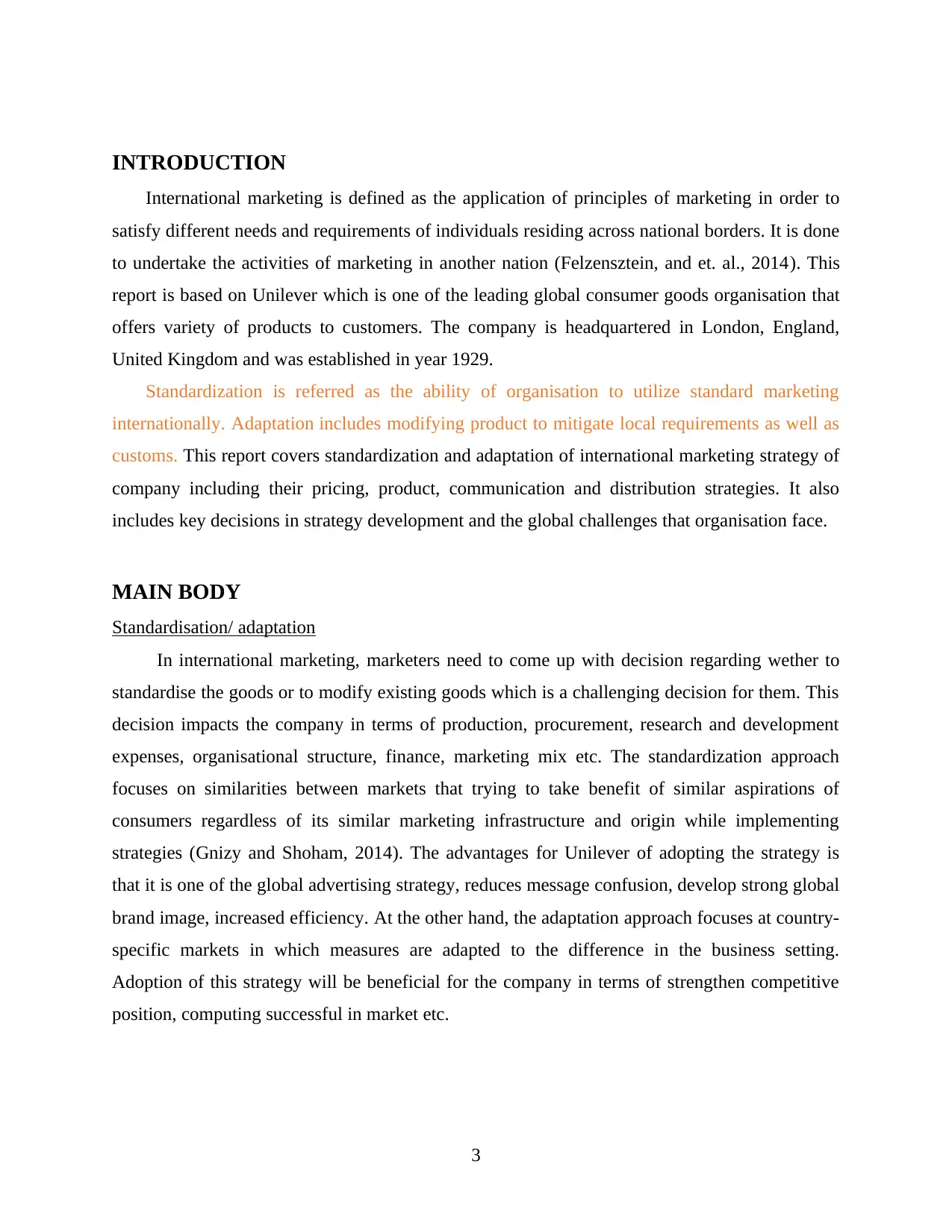
INTRODUCTION
International marketing is defined as the application of principles of marketing in order to
satisfy different needs and requirements of individuals residing across national borders. It is done
to undertake the activities of marketing in another nation (Felzensztein, and et. al., 2014). This
report is based on Unilever which is one of the leading global consumer goods organisation that
offers variety of products to customers. The company is headquartered in London, England,
United Kingdom and was established in year 1929.
Standardization is referred as the ability of organisation to utilize standard marketing
internationally. Adaptation includes modifying product to mitigate local requirements as well as
customs. This report covers standardization and adaptation of international marketing strategy of
company including their pricing, product, communication and distribution strategies. It also
includes key decisions in strategy development and the global challenges that organisation face.
MAIN BODY
Standardisation/ adaptation
In international marketing, marketers need to come up with decision regarding wether to
standardise the goods or to modify existing goods which is a challenging decision for them. This
decision impacts the company in terms of production, procurement, research and development
expenses, organisational structure, finance, marketing mix etc. The standardization approach
focuses on similarities between markets that trying to take benefit of similar aspirations of
consumers regardless of its similar marketing infrastructure and origin while implementing
strategies (Gnizy and Shoham, 2014). The advantages for Unilever of adopting the strategy is
that it is one of the global advertising strategy, reduces message confusion, develop strong global
brand image, increased efficiency. At the other hand, the adaptation approach focuses at country-
specific markets in which measures are adapted to the difference in the business setting.
Adoption of this strategy will be beneficial for the company in terms of strengthen competitive
position, computing successful in market etc.
3
International marketing is defined as the application of principles of marketing in order to
satisfy different needs and requirements of individuals residing across national borders. It is done
to undertake the activities of marketing in another nation (Felzensztein, and et. al., 2014). This
report is based on Unilever which is one of the leading global consumer goods organisation that
offers variety of products to customers. The company is headquartered in London, England,
United Kingdom and was established in year 1929.
Standardization is referred as the ability of organisation to utilize standard marketing
internationally. Adaptation includes modifying product to mitigate local requirements as well as
customs. This report covers standardization and adaptation of international marketing strategy of
company including their pricing, product, communication and distribution strategies. It also
includes key decisions in strategy development and the global challenges that organisation face.
MAIN BODY
Standardisation/ adaptation
In international marketing, marketers need to come up with decision regarding wether to
standardise the goods or to modify existing goods which is a challenging decision for them. This
decision impacts the company in terms of production, procurement, research and development
expenses, organisational structure, finance, marketing mix etc. The standardization approach
focuses on similarities between markets that trying to take benefit of similar aspirations of
consumers regardless of its similar marketing infrastructure and origin while implementing
strategies (Gnizy and Shoham, 2014). The advantages for Unilever of adopting the strategy is
that it is one of the global advertising strategy, reduces message confusion, develop strong global
brand image, increased efficiency. At the other hand, the adaptation approach focuses at country-
specific markets in which measures are adapted to the difference in the business setting.
Adoption of this strategy will be beneficial for the company in terms of strengthen competitive
position, computing successful in market etc.
3
⊘ This is a preview!⊘
Do you want full access?
Subscribe today to unlock all pages.

Trusted by 1+ million students worldwide
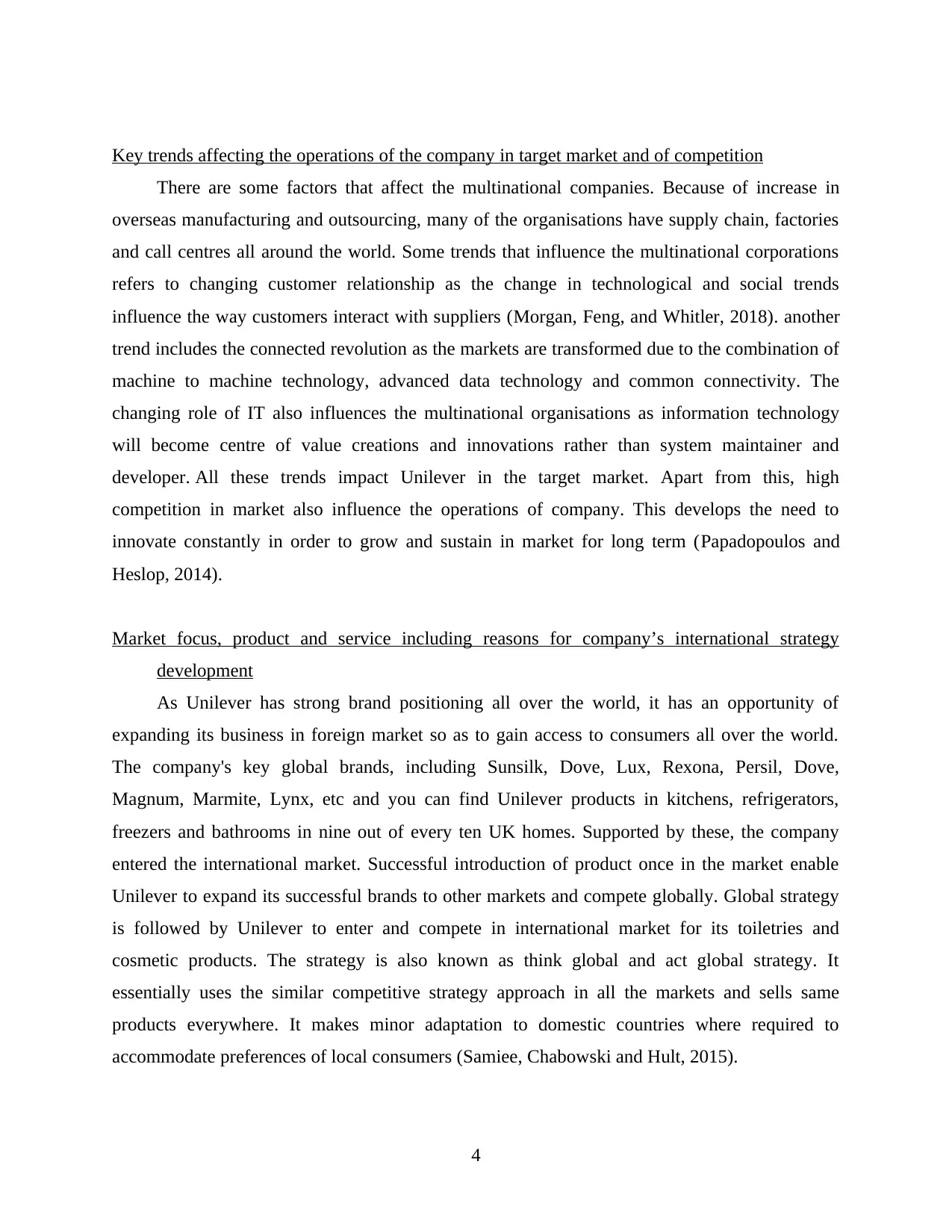
Key trends affecting the operations of the company in target market and of competition
There are some factors that affect the multinational companies. Because of increase in
overseas manufacturing and outsourcing, many of the organisations have supply chain, factories
and call centres all around the world. Some trends that influence the multinational corporations
refers to changing customer relationship as the change in technological and social trends
influence the way customers interact with suppliers (Morgan, Feng, and Whitler, 2018). another
trend includes the connected revolution as the markets are transformed due to the combination of
machine to machine technology, advanced data technology and common connectivity. The
changing role of IT also influences the multinational organisations as information technology
will become centre of value creations and innovations rather than system maintainer and
developer. All these trends impact Unilever in the target market. Apart from this, high
competition in market also influence the operations of company. This develops the need to
innovate constantly in order to grow and sustain in market for long term (Papadopoulos and
Heslop, 2014).
Market focus, product and service including reasons for company’s international strategy
development
As Unilever has strong brand positioning all over the world, it has an opportunity of
expanding its business in foreign market so as to gain access to consumers all over the world.
The company's key global brands, including Sunsilk, Dove, Lux, Rexona, Persil, Dove,
Magnum, Marmite, Lynx, etc and you can find Unilever products in kitchens, refrigerators,
freezers and bathrooms in nine out of every ten UK homes. Supported by these, the company
entered the international market. Successful introduction of product once in the market enable
Unilever to expand its successful brands to other markets and compete globally. Global strategy
is followed by Unilever to enter and compete in international market for its toiletries and
cosmetic products. The strategy is also known as think global and act global strategy. It
essentially uses the similar competitive strategy approach in all the markets and sells same
products everywhere. It makes minor adaptation to domestic countries where required to
accommodate preferences of local consumers (Samiee, Chabowski and Hult, 2015).
4
There are some factors that affect the multinational companies. Because of increase in
overseas manufacturing and outsourcing, many of the organisations have supply chain, factories
and call centres all around the world. Some trends that influence the multinational corporations
refers to changing customer relationship as the change in technological and social trends
influence the way customers interact with suppliers (Morgan, Feng, and Whitler, 2018). another
trend includes the connected revolution as the markets are transformed due to the combination of
machine to machine technology, advanced data technology and common connectivity. The
changing role of IT also influences the multinational organisations as information technology
will become centre of value creations and innovations rather than system maintainer and
developer. All these trends impact Unilever in the target market. Apart from this, high
competition in market also influence the operations of company. This develops the need to
innovate constantly in order to grow and sustain in market for long term (Papadopoulos and
Heslop, 2014).
Market focus, product and service including reasons for company’s international strategy
development
As Unilever has strong brand positioning all over the world, it has an opportunity of
expanding its business in foreign market so as to gain access to consumers all over the world.
The company's key global brands, including Sunsilk, Dove, Lux, Rexona, Persil, Dove,
Magnum, Marmite, Lynx, etc and you can find Unilever products in kitchens, refrigerators,
freezers and bathrooms in nine out of every ten UK homes. Supported by these, the company
entered the international market. Successful introduction of product once in the market enable
Unilever to expand its successful brands to other markets and compete globally. Global strategy
is followed by Unilever to enter and compete in international market for its toiletries and
cosmetic products. The strategy is also known as think global and act global strategy. It
essentially uses the similar competitive strategy approach in all the markets and sells same
products everywhere. It makes minor adaptation to domestic countries where required to
accommodate preferences of local consumers (Samiee, Chabowski and Hult, 2015).
4
Paraphrase This Document
Need a fresh take? Get an instant paraphrase of this document with our AI Paraphraser
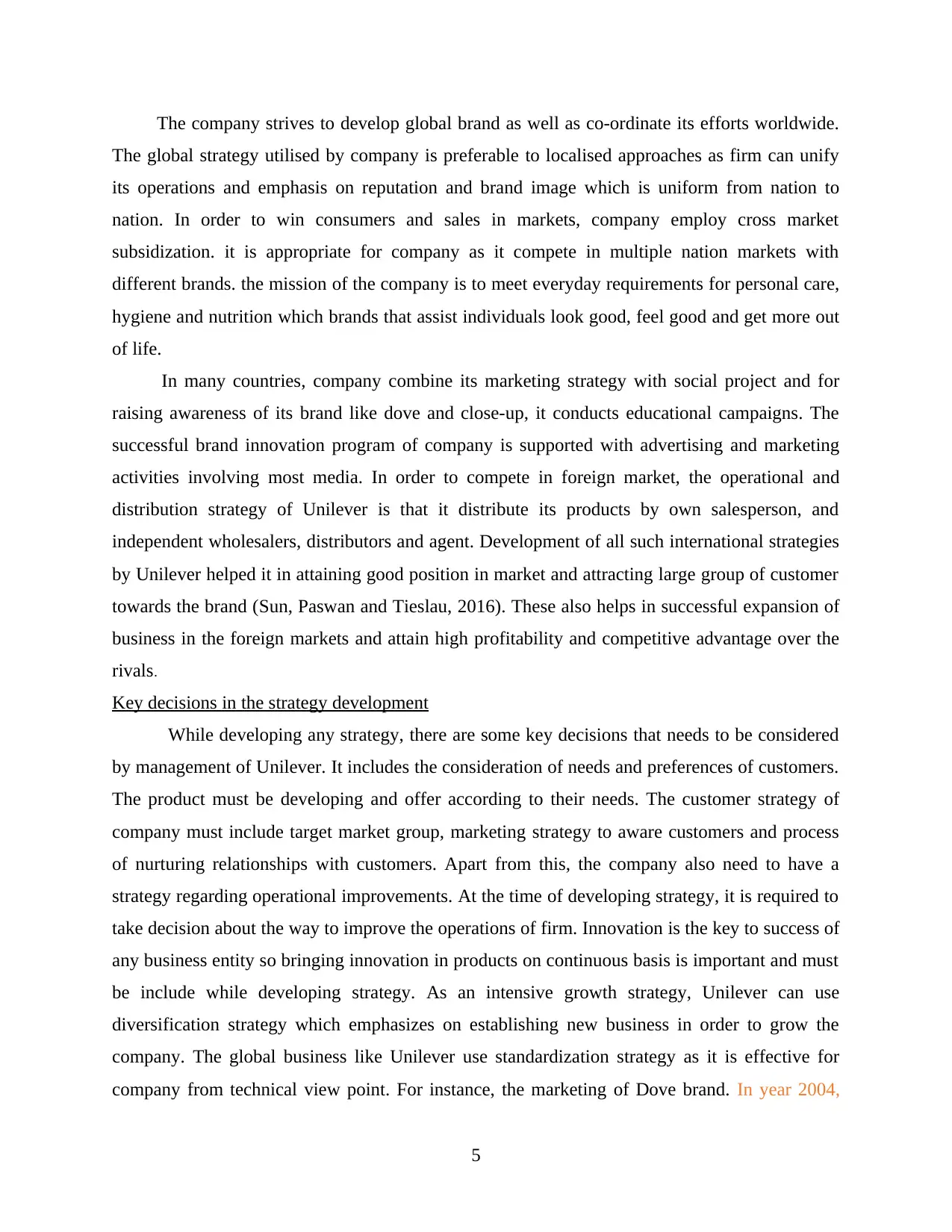
The company strives to develop global brand as well as co-ordinate its efforts worldwide.
The global strategy utilised by company is preferable to localised approaches as firm can unify
its operations and emphasis on reputation and brand image which is uniform from nation to
nation. In order to win consumers and sales in markets, company employ cross market
subsidization. it is appropriate for company as it compete in multiple nation markets with
different brands. the mission of the company is to meet everyday requirements for personal care,
hygiene and nutrition which brands that assist individuals look good, feel good and get more out
of life.
In many countries, company combine its marketing strategy with social project and for
raising awareness of its brand like dove and close-up, it conducts educational campaigns. The
successful brand innovation program of company is supported with advertising and marketing
activities involving most media. In order to compete in foreign market, the operational and
distribution strategy of Unilever is that it distribute its products by own salesperson, and
independent wholesalers, distributors and agent. Development of all such international strategies
by Unilever helped it in attaining good position in market and attracting large group of customer
towards the brand (Sun, Paswan and Tieslau, 2016). These also helps in successful expansion of
business in the foreign markets and attain high profitability and competitive advantage over the
rivals.
Key decisions in the strategy development
While developing any strategy, there are some key decisions that needs to be considered
by management of Unilever. It includes the consideration of needs and preferences of customers.
The product must be developing and offer according to their needs. The customer strategy of
company must include target market group, marketing strategy to aware customers and process
of nurturing relationships with customers. Apart from this, the company also need to have a
strategy regarding operational improvements. At the time of developing strategy, it is required to
take decision about the way to improve the operations of firm. Innovation is the key to success of
any business entity so bringing innovation in products on continuous basis is important and must
be include while developing strategy. As an intensive growth strategy, Unilever can use
diversification strategy which emphasizes on establishing new business in order to grow the
company. The global business like Unilever use standardization strategy as it is effective for
company from technical view point. For instance, the marketing of Dove brand. In year 2004,
5
The global strategy utilised by company is preferable to localised approaches as firm can unify
its operations and emphasis on reputation and brand image which is uniform from nation to
nation. In order to win consumers and sales in markets, company employ cross market
subsidization. it is appropriate for company as it compete in multiple nation markets with
different brands. the mission of the company is to meet everyday requirements for personal care,
hygiene and nutrition which brands that assist individuals look good, feel good and get more out
of life.
In many countries, company combine its marketing strategy with social project and for
raising awareness of its brand like dove and close-up, it conducts educational campaigns. The
successful brand innovation program of company is supported with advertising and marketing
activities involving most media. In order to compete in foreign market, the operational and
distribution strategy of Unilever is that it distribute its products by own salesperson, and
independent wholesalers, distributors and agent. Development of all such international strategies
by Unilever helped it in attaining good position in market and attracting large group of customer
towards the brand (Sun, Paswan and Tieslau, 2016). These also helps in successful expansion of
business in the foreign markets and attain high profitability and competitive advantage over the
rivals.
Key decisions in the strategy development
While developing any strategy, there are some key decisions that needs to be considered
by management of Unilever. It includes the consideration of needs and preferences of customers.
The product must be developing and offer according to their needs. The customer strategy of
company must include target market group, marketing strategy to aware customers and process
of nurturing relationships with customers. Apart from this, the company also need to have a
strategy regarding operational improvements. At the time of developing strategy, it is required to
take decision about the way to improve the operations of firm. Innovation is the key to success of
any business entity so bringing innovation in products on continuous basis is important and must
be include while developing strategy. As an intensive growth strategy, Unilever can use
diversification strategy which emphasizes on establishing new business in order to grow the
company. The global business like Unilever use standardization strategy as it is effective for
company from technical view point. For instance, the marketing of Dove brand. In year 2004,
5
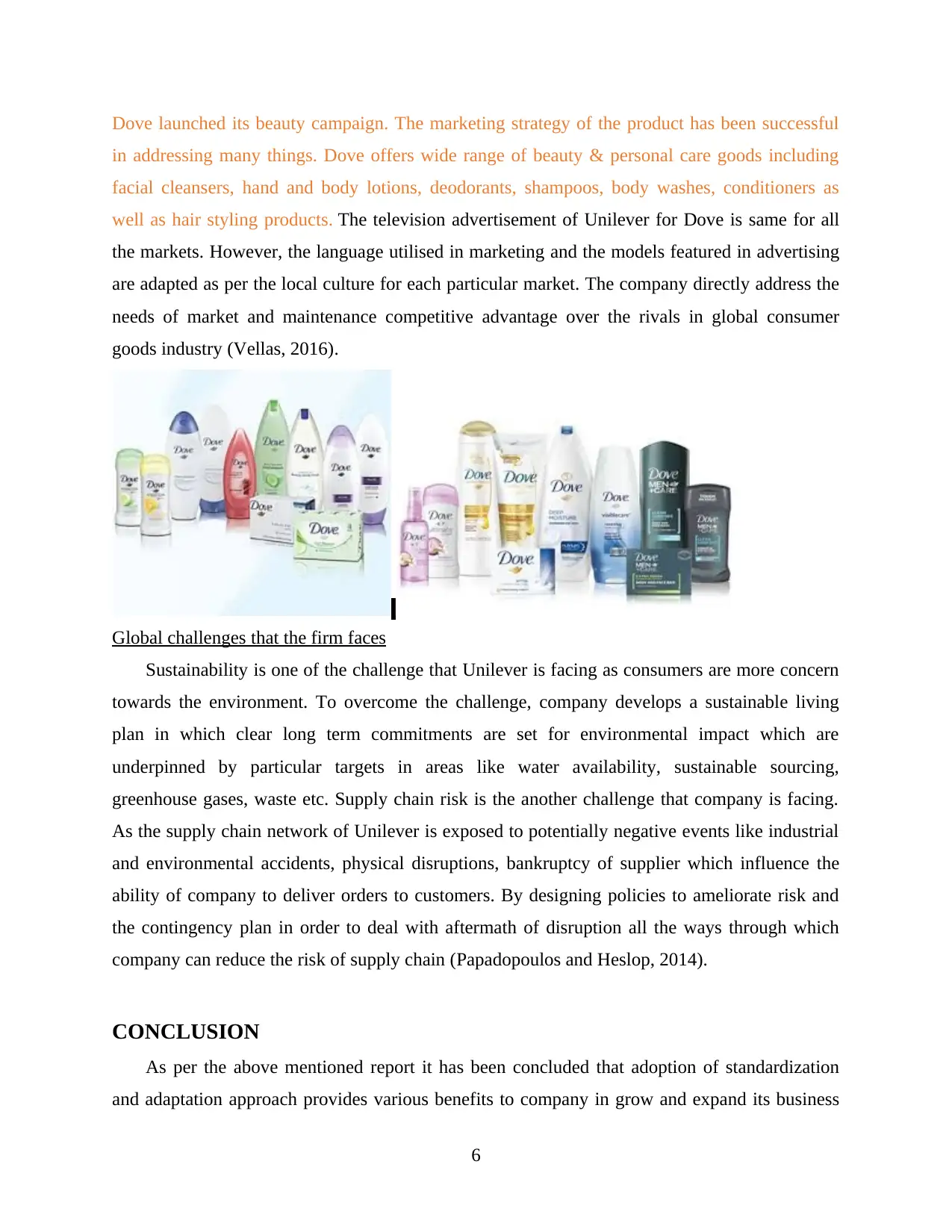
Dove launched its beauty campaign. The marketing strategy of the product has been successful
in addressing many things. Dove offers wide range of beauty & personal care goods including
facial cleansers, hand and body lotions, deodorants, shampoos, body washes, conditioners as
well as hair styling products. The television advertisement of Unilever for Dove is same for all
the markets. However, the language utilised in marketing and the models featured in advertising
are adapted as per the local culture for each particular market. The company directly address the
needs of market and maintenance competitive advantage over the rivals in global consumer
goods industry (Vellas, 2016).
Global challenges that the firm faces
Sustainability is one of the challenge that Unilever is facing as consumers are more concern
towards the environment. To overcome the challenge, company develops a sustainable living
plan in which clear long term commitments are set for environmental impact which are
underpinned by particular targets in areas like water availability, sustainable sourcing,
greenhouse gases, waste etc. Supply chain risk is the another challenge that company is facing.
As the supply chain network of Unilever is exposed to potentially negative events like industrial
and environmental accidents, physical disruptions, bankruptcy of supplier which influence the
ability of company to deliver orders to customers. By designing policies to ameliorate risk and
the contingency plan in order to deal with aftermath of disruption all the ways through which
company can reduce the risk of supply chain (Papadopoulos and Heslop, 2014).
CONCLUSION
As per the above mentioned report it has been concluded that adoption of standardization
and adaptation approach provides various benefits to company in grow and expand its business
6
in addressing many things. Dove offers wide range of beauty & personal care goods including
facial cleansers, hand and body lotions, deodorants, shampoos, body washes, conditioners as
well as hair styling products. The television advertisement of Unilever for Dove is same for all
the markets. However, the language utilised in marketing and the models featured in advertising
are adapted as per the local culture for each particular market. The company directly address the
needs of market and maintenance competitive advantage over the rivals in global consumer
goods industry (Vellas, 2016).
Global challenges that the firm faces
Sustainability is one of the challenge that Unilever is facing as consumers are more concern
towards the environment. To overcome the challenge, company develops a sustainable living
plan in which clear long term commitments are set for environmental impact which are
underpinned by particular targets in areas like water availability, sustainable sourcing,
greenhouse gases, waste etc. Supply chain risk is the another challenge that company is facing.
As the supply chain network of Unilever is exposed to potentially negative events like industrial
and environmental accidents, physical disruptions, bankruptcy of supplier which influence the
ability of company to deliver orders to customers. By designing policies to ameliorate risk and
the contingency plan in order to deal with aftermath of disruption all the ways through which
company can reduce the risk of supply chain (Papadopoulos and Heslop, 2014).
CONCLUSION
As per the above mentioned report it has been concluded that adoption of standardization
and adaptation approach provides various benefits to company in grow and expand its business
6
⊘ This is a preview!⊘
Do you want full access?
Subscribe today to unlock all pages.

Trusted by 1+ million students worldwide
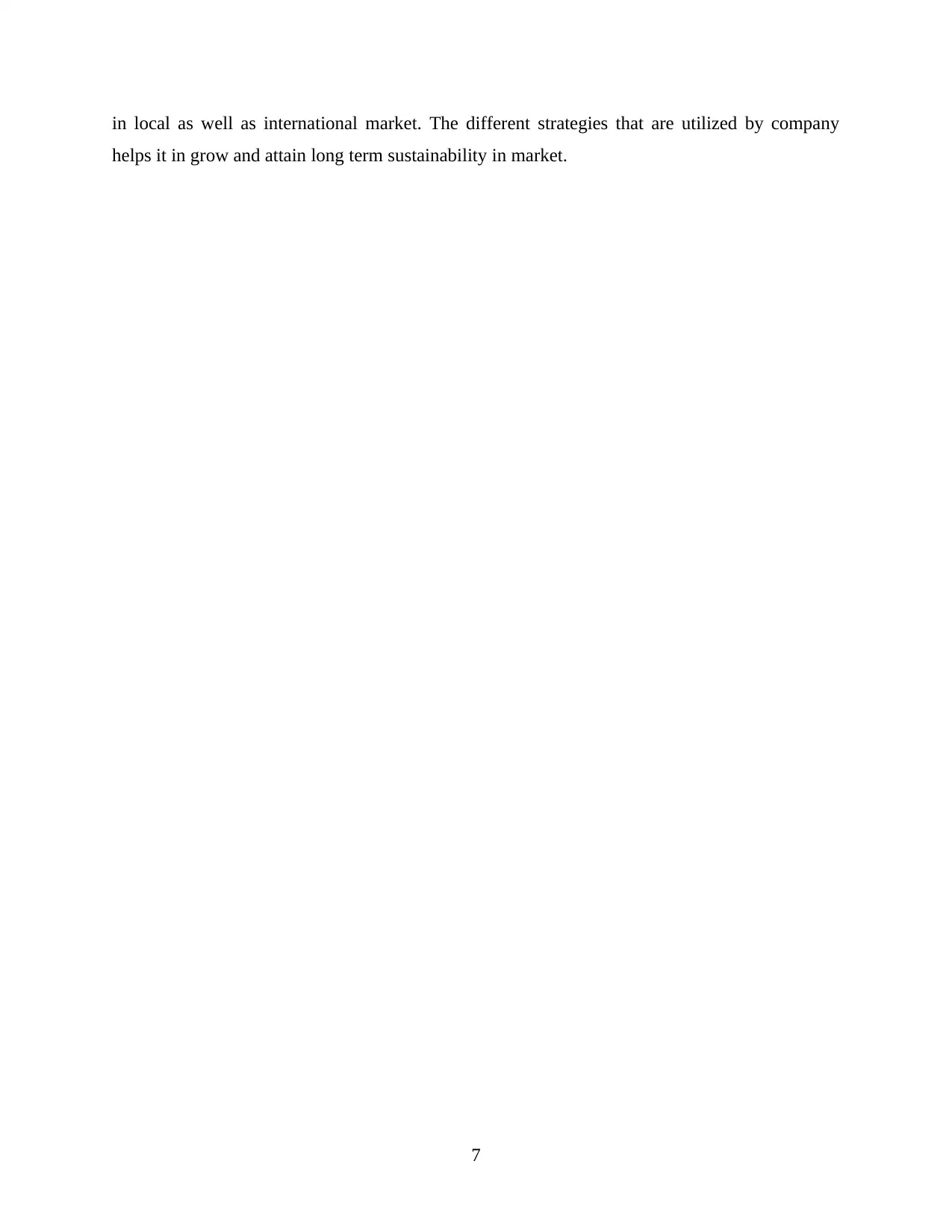
in local as well as international market. The different strategies that are utilized by company
helps it in grow and attain long term sustainability in market.
7
helps it in grow and attain long term sustainability in market.
7
Paraphrase This Document
Need a fresh take? Get an instant paraphrase of this document with our AI Paraphraser
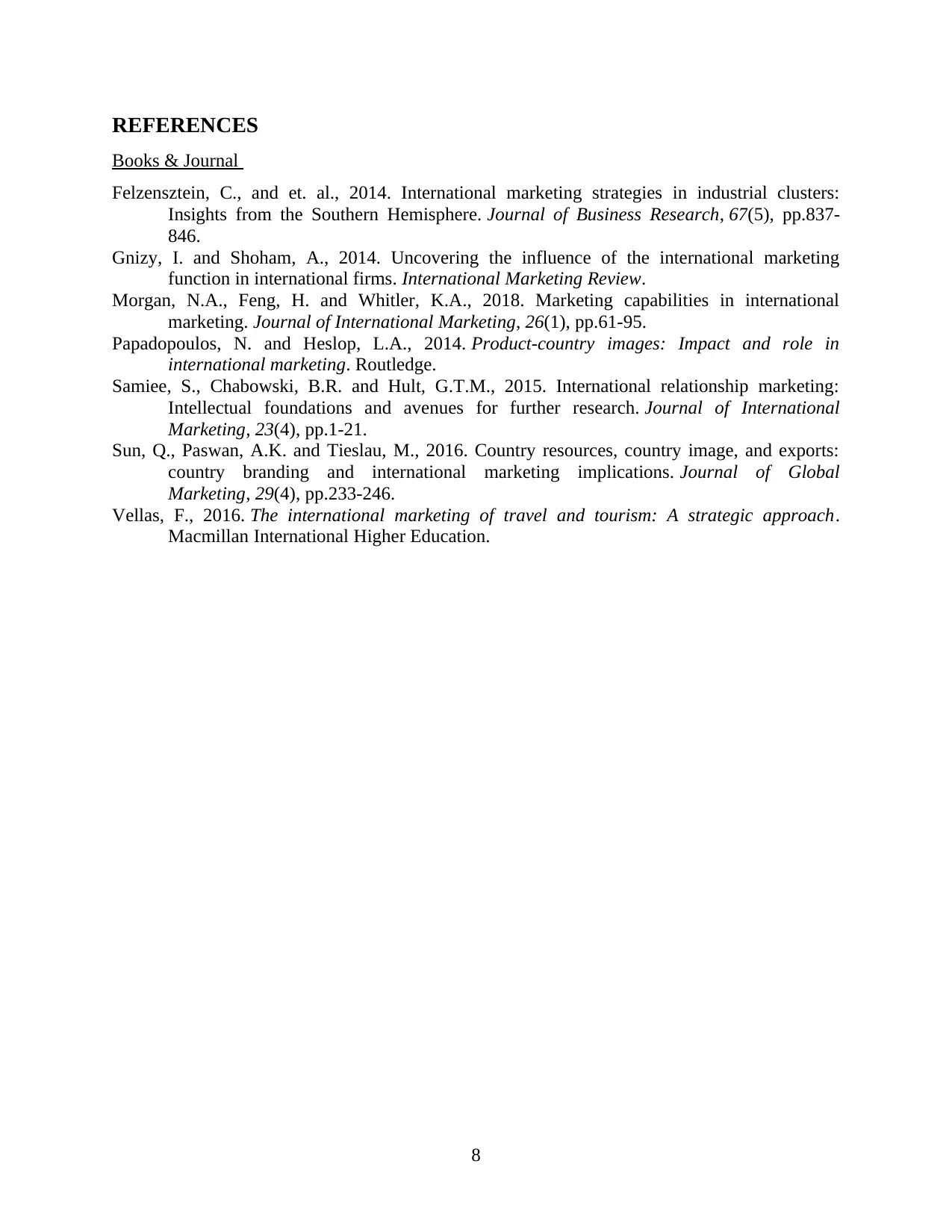
REFERENCES
Books & Journal
Felzensztein, C., and et. al., 2014. International marketing strategies in industrial clusters:
Insights from the Southern Hemisphere. Journal of Business Research, 67(5), pp.837-
846.
Gnizy, I. and Shoham, A., 2014. Uncovering the influence of the international marketing
function in international firms. International Marketing Review.
Morgan, N.A., Feng, H. and Whitler, K.A., 2018. Marketing capabilities in international
marketing. Journal of International Marketing, 26(1), pp.61-95.
Papadopoulos, N. and Heslop, L.A., 2014. Product-country images: Impact and role in
international marketing. Routledge.
Samiee, S., Chabowski, B.R. and Hult, G.T.M., 2015. International relationship marketing:
Intellectual foundations and avenues for further research. Journal of International
Marketing, 23(4), pp.1-21.
Sun, Q., Paswan, A.K. and Tieslau, M., 2016. Country resources, country image, and exports:
country branding and international marketing implications. Journal of Global
Marketing, 29(4), pp.233-246.
Vellas, F., 2016. The international marketing of travel and tourism: A strategic approach.
Macmillan International Higher Education.
8
Books & Journal
Felzensztein, C., and et. al., 2014. International marketing strategies in industrial clusters:
Insights from the Southern Hemisphere. Journal of Business Research, 67(5), pp.837-
846.
Gnizy, I. and Shoham, A., 2014. Uncovering the influence of the international marketing
function in international firms. International Marketing Review.
Morgan, N.A., Feng, H. and Whitler, K.A., 2018. Marketing capabilities in international
marketing. Journal of International Marketing, 26(1), pp.61-95.
Papadopoulos, N. and Heslop, L.A., 2014. Product-country images: Impact and role in
international marketing. Routledge.
Samiee, S., Chabowski, B.R. and Hult, G.T.M., 2015. International relationship marketing:
Intellectual foundations and avenues for further research. Journal of International
Marketing, 23(4), pp.1-21.
Sun, Q., Paswan, A.K. and Tieslau, M., 2016. Country resources, country image, and exports:
country branding and international marketing implications. Journal of Global
Marketing, 29(4), pp.233-246.
Vellas, F., 2016. The international marketing of travel and tourism: A strategic approach.
Macmillan International Higher Education.
8
1 out of 8
Related Documents
Your All-in-One AI-Powered Toolkit for Academic Success.
+13062052269
info@desklib.com
Available 24*7 on WhatsApp / Email
![[object Object]](/_next/static/media/star-bottom.7253800d.svg)
Unlock your academic potential
Copyright © 2020–2026 A2Z Services. All Rights Reserved. Developed and managed by ZUCOL.




